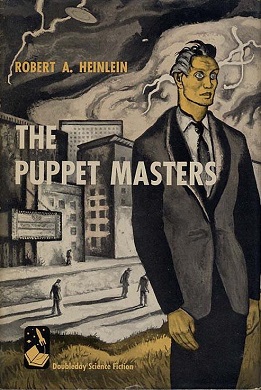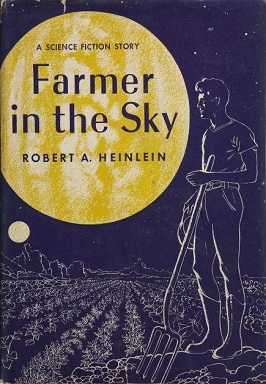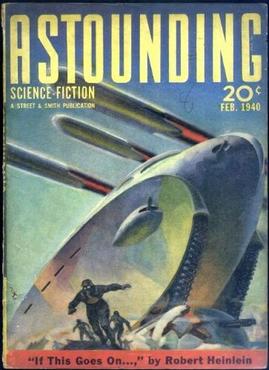External links
- Beyond Doubt title listing at the Internet Speculative Fiction Database
Beyond Doubt is a science fiction story written by Robert A. Heinlein, originally printed in Astonishing Stories in April 1941 under the pen name "Lyle Monroe and Elma Wentz".
It was published again in 1984 as by Heinlein in Election Day 2084: Science Fiction Stories on the Politics of the Future (edited by Isaac Asimov and Martin H. Greenberg), and posthumously in 2005 in the Heinlein collection Off the Main Sequence .
The short story is prefaced by an excerpt from an article about Professor J. Howard Erlenmeyer, who claims to have solved the mystery of the Easter Island statues, saying they were beyond doubt religious artifacts.
On the continent Mu, in the province of Lac, a governor is about to be elected. Robar, Clevum and Dolph are three campaign workers trying to get Talus elected, but every time they have an idea to counter the smear campaign from incumbent governor Vortus, their boss Oric claims Talus is so noble that he won't allow it. Finally they decide to distribute stone statue caricatures (huge noses and bat ears) of Vortus to the polling places at election day. Oric agrees and says he will get a priest to levitate the statues, but no priest ever arrives. The three workers realize Oric has sold them out. In a last-ditch attempt, they recruit an alcoholic ex-priest to perform the levitation, but he only manages to scatter the statues over a short distance before succumbing to a drunken stupor. Admitting defeat, Clevus states that he sometimes thinks that what their country needs is an earthquake.

Robert Anson Heinlein was an American science fiction author, aeronautical engineer, and naval officer. Sometimes called the "dean of science fiction writers", he was among the first to emphasize scientific accuracy in his fiction, and was thus a pioneer of the subgenre of hard science fiction. His published works, both fiction and non-fiction, express admiration for competence and emphasize the value of critical thinking. His plots often posed provocative situations which challenged conventional social mores. His work continues to have an influence on the science-fiction genre, and on modern culture more generally.

The Puppet Masters is a 1951 science fiction novel by American writer Robert A. Heinlein, in which American secret agents battle parasitic invaders from outer space. It was originally serialized in Galaxy Science Fiction.

Farmer In The Sky is a 1950 science fiction novel by American writer Robert A. Heinlein about a teenaged boy who emigrates with his family to Jupiter's moon Ganymede, which is in the process of being terraformed. Among Heinlein's juveniles, a condensed version of the novel was published in serial form in Boys' Life magazine, under the title "Satellite Scout". The novel was awarded a Retro Hugo in 2001.
" '—All You Zombies—' " is a science fiction short story by American writer Robert A. Heinlein. It was written in one day, July 11, 1958, and first published in the March 1959 issue of The Magazine of Fantasy & Science Fiction after being rejected by Playboy.

"If This Goes On—" is a science fiction novella by American writer Robert A. Heinlein, first serialized in 1940 in Astounding Science-Fiction and revised and expanded to novel length for inclusion in the 1953 collection Revolt in 2100. The story shows what might happen to Christianity in the United States with mass communications, applied psychology, and a hysterical populace. The story is part of Heinlein's Future History series.
"The Green Hills of Earth" is a science fiction short story by American writer Robert A. Heinlein. One of his Future History stories, the short story originally appeared in The Saturday Evening Post, and it was collected in The Green Hills of Earth. Heinlein selected the story for inclusion in the 1949 anthology My Best Science Fiction Story. "The Green Hills of Earth" is also the title of a song mentioned in several of Heinlein's novels.
"The Long Watch" is a science fiction short story by American writer Robert A. Heinlein. It is about a military officer who faces a coup d'état by a would-be dictator.

The Rolling Stones is a 1952 science fiction novel by American writer Robert A. Heinlein.

Robert James Sawyer is a Canadian and American science fiction writer. He has had 24 novels published and his short fiction has appeared in Analog Science Fiction and Fact, Amazing Stories, On Spec, Nature, and numerous anthologies. He has won many writing awards, including the best-novel Nebula Award (1995), the best-novel Hugo Award (2003), the John W. Campbell Memorial Award (2006), the Robert A. Heinlein Award (2017), and more Aurora Awards than anyone else in history.

End Poverty in California (EPIC) was a political campaign started in 1934 by socialist writer Upton Sinclair. The movement formed the basis for Sinclair's campaign for Governor of California in 1934. The plan called for a massive public works program, sweeping tax reform, and guaranteed pensions. It gained major popular support, with thousands joining End Poverty Leagues across the state. EPIC never came to fruition due to Sinclair's defeat in the 1934 election, but is seen as an influence on New Deal programs enacted by President Franklin D. Roosevelt.
"Solution Unsatisfactory" is a 1941 science fiction short story by American writer Robert A. Heinlein. It describes the US effort to build a nuclear weapon in order to end the ongoing World War II, and its dystopian consequences to the nation and the world.
The science fiction writer Robert A. Heinlein (1907–1988) was productive during a writing career that spanned the last 49 years of his life; the Robert A. Heinlein bibliography includes 32 novels, 59 short stories and 16 collections published during his life. Four films, two TV series, several episodes of a radio series, at least two songs and a board game derive more or less directly from his work. He wrote the screenplay for Destination Moon (1950). Heinlein also edited an anthology of other writers' science fiction short stories.
"The Return of William Proxmire" is a short story by Larry Niven first published in 1989 in the anthology What Might Have Been? Volume 1: Alternate Empires, edited by Gregory Benford.

The Glory That Was is a science fiction novel by American writer L. Sprague de Camp. It was first published in the science fiction magazine Startling Stories for April, 1952, and subsequently published in book form in hardcover by Avalon Books in 1960 and in paperback by Paperback Library in March 1971. It has since been reprinted in paperback by Ace Books in July 1979 and Baen Books in April 1992, and in trade paperback by Phoenix Pick in September 2014. An E-book edition was published by Gollancz's SF Gateway imprint on September 29, 2011 as part of a general release of de Camp's works in electronic form; a second e-book edition was issued by Phoenix Pick in September 2014. The book has also been translated into Italian, German and Greek.
"A Bathroom of Her Own" is a short story by Robert A. Heinlein about a political campaign in the U.S. after World War II. Written in 1946, it was unpublished until printed in Heinlein's Expanded Universe (1980). The story has no science fiction or fantasy elements.
Delos David Harriman, known as D.D. Harriman, is a character in the fiction of science fiction author Robert A. Heinlein. He is an entrepreneurial businessman who masterminded the first landing on the Moon as a private business venture. His story is part of Heinlein's Future History.
The Heinlein juveniles are the science-fiction novels written by Robert A. Heinlein for Scribner's young-adult line. Each features "a young male protagonist entering the adult world of conflict, decisions, and responsibilities." Together, they tell a loosely connected story of space exploration. Scribner's published the first 12 between 1947 and 1958, but rejected the 13th, Starship Troopers. That one was instead published by Putnam. A 14th novel, Podkayne of Mars, is sometimes listed as a "Heinlein juvenile", although Heinlein himself did not consider it to be one.

Off the Main Sequence: The Other Science Fiction Stories of Robert A. Heinlein (ISBN 1-58288-184-7) is a collection of 27 short stories by American writer Robert A. Heinlein, including three that were never previously collected in book form.

Charles Wesley Lyon was an American attorney from California who served as a Republican in the California State Assembly and the California State Senate. Lyon was Assembly Speaker from 1943 to 1946. Lyon was admitted to the bar in 1910 and was first elected to the Assembly in 1914. Lyon served numerous terms in the Senate and Assembly and authored the legislation creating the UCLA campus.
My Object All Sublime is a science fiction short story written by Robert A. Heinlein, originally printed under the pen name Lyle Monroe, in the February 1942 issue of Future magazine. Its plot follows an invisible man through his adventures.